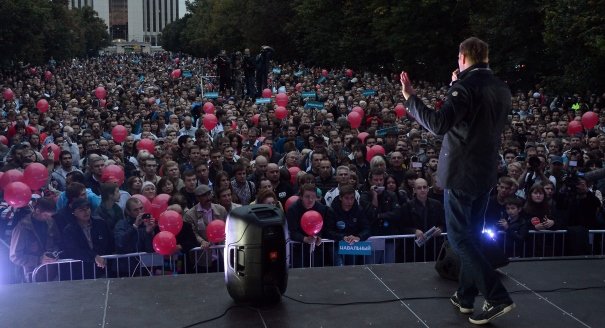Have elections come back to Russia? There are a lot of speculations regarding the restoration of the role of political capitals—Moscow and Yekaterinburg, about new Volodin-style competitive politics instead of Surkov’s political technologies, etc. In my view, this is much ado about nothing much at all. So far it looks more like a change of decor from the Kremlin’s side rather than essential shifts by the authorities.
This time elections are far more numerous than last year—there are large scale elections in 33 regions, including gubernatorial in 8 regions, to regional assemblies in 16 regions, and of mayors in 11 regional capitals. Not only the numbers matter, but unlike a year ago when gubernatorial races after a long break took place in a few carefully chosen regions, where the Kremlin felt comfortable with them, this time the new model is tested in more real life conditions. For the first time, elections take place practically at the end of the summer vacation season which makes it easier to use administrative resource but leads to lower turnout and thus lower legitimacy.
Participation in races of three “radical opposition” candidates— Alexey Navalny in Moscow, Yevgeny Roizman in Yekaterinburg, and Gennady Gudkov in the Moscow Oblast, is used by some as an illustration of a new Kremlin’s approach. It is indeed the case, especially in Yekaterinburg, although this kind of a “controlled competition” is more of a décor and letting steam out than a real attempt to promote competition. Firstly, Moscow and the Moscow Oblast gubernatorial races were considered by the Kremlin as the easiest to win because of the popularity of the state-supported incumbents according to sociological polls. It would have been foolish not to improve the image of these races adding to the overall legitimacy of the elections as a result. Secondly, the Kremlin, when making opposition “a favor,” by itself chose whom to register. The Kremlin considers as the major threat the split of elites, as well as the counter-elites groups. This is especially true with regard to those regions where long-time governors have been recently replaced, including Moscow, Vladimir Oblast, and Zabaikalsky Krai. Prokhorov was considered to be a bigger risk for the Moscow race than Navalny because he could be backed by remainders of Luzhkov’s elites. For the same reasons two strong candidates nominated by Prokhorov’s Civic Platform have not been registered in Vladimir and Chita.
Russian electoral authoritarianism is still in place and we are witnessing not only “cracks in its wall” as Vladimir Gelman has put it, but also attempts to strengthen this wall and to embellish it using bright colors. This time it is about formal participation of several dozen political parties including 25 which did nominate their candidates in gubernatorial races and 17.4 per region on the average which participate in regional legislative elections. This cannot conceal the fact that the party system which is very weak in Russia has weakened further in these elections. Not only is this true about the three “systemic opposition” parties represented in the Duma, but this also relates to the United Russia. It looks like the Kremlin does not want either to improve its image, or to replace it by a different party. It wants to address voters directly using amorphous People’s Front which can take any “attractive” shape any time and helps the current leadership to stay in power without bearing responsibility.
Nevertheless forthcoming elections are important for both the authorities and the Russian society. The society needs success stories and it did already get two—of Alexey Navalny at the capital of the country and Yevgeny Roizman at the capital of the Urals. It is extremely important to show that the political protest did not disappear and that it can be converted into proactive and constructive participation. As for the authorities, they are testing the model of early elections in Moscow and, if successful, it can be used for other early gubernatorial elections, and, perhaps, even early State Duma elections.
Answering the question posed at the very beginning, I should say that I feel rather optimistic with regard to what is going on in elections in terms of what can be called a reactive political modernization. The Kremlin being faced with serious challenges is trying to react and to preserve the system by making some improvements—not in order to make citizens happy but in order to survive. This makes the whole process of political modernization well-grounded and self-sustainable.
Nikolay Petrov is a professor at the Higher School of Economics.
